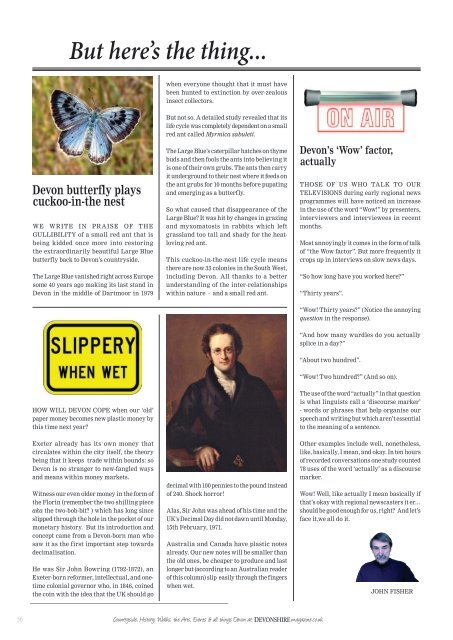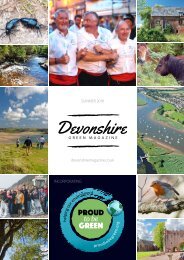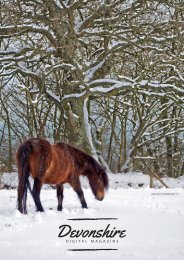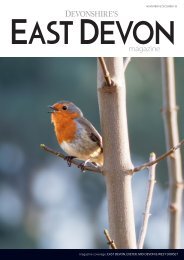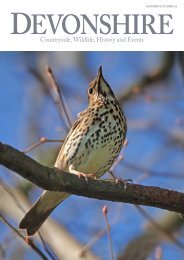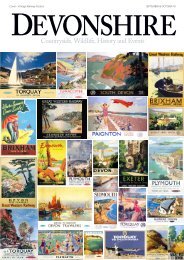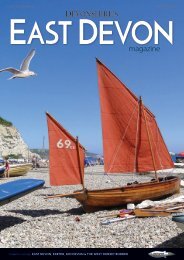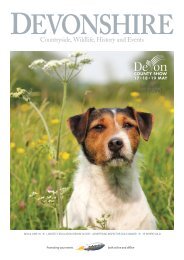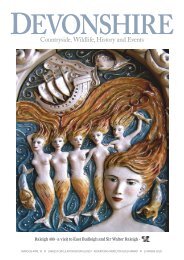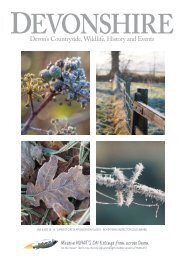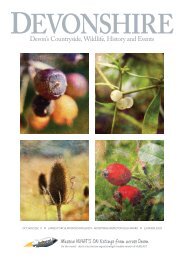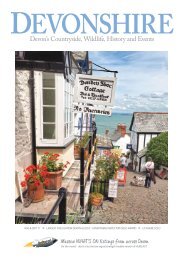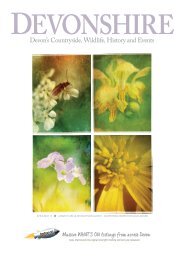Devonshire October November 16
Create successful ePaper yourself
Turn your PDF publications into a flip-book with our unique Google optimized e-Paper software.
But here’s the thing...<br />
when everyone thought that it must have<br />
been hunted to extinction by over-zealous<br />
insect collectors.<br />
But not so. A detailed study revealed that its<br />
life cycle was completely dependent on a small<br />
red ant called Myrmica sabuleti.<br />
Devon butterfly plays<br />
cuckoo-in-the nest<br />
WE WRITE IN PRAISE OF THE<br />
GULLIBILITY of a small red ant that is<br />
being kidded once more into restoring<br />
the extraordinarily beautiful Large Blue<br />
butterfly back to Devon’s countryside.<br />
The Large Blue vanished right across Europe<br />
some 40 years ago making its last stand in<br />
Devon in the middle of Dartmoor in 1979<br />
The Large Blue’s caterpillar hatches on thyme<br />
buds and then fools the ants into believing it<br />
is one of their own grubs. The ants then carry<br />
it underground to their nest where it feeds on<br />
the ant grubs for 10 months before pupating<br />
and emerging as a butterfly.<br />
So what caused that disappearance of the<br />
Large Blue? It was hit by changes in grazing<br />
and myxomatosis in rabbits which left<br />
grassland too tall and shady for the heatloving<br />
red ant.<br />
This cuckoo-in-the-nest life cycle means<br />
there are now 33 colonies in the South West,<br />
including Devon. All thanks to a better<br />
understanding of the inter-relationships<br />
within nature - and a small red ant.<br />
Devon’s ‘Wow’ factor,<br />
actually<br />
THOSE OF US WHO TALK TO OUR<br />
TELEVISIONS during early regional news<br />
programmes will have noticed an increase<br />
in the use of the word “Wow!” by presenters,<br />
interviewers and interviewees in recent<br />
months.<br />
Most annoyingly it comes in the form of talk<br />
of “the Wow factor”. But more frequently it<br />
crops up in interviews on slow news days.<br />
“So how long have you worked here?”<br />
“Thirty years”.<br />
“Wow! Thirty years?” (Notice the annoying<br />
question in the response).<br />
“And how many wurdles do you actually<br />
splice in a day?”<br />
“About two hundred”.<br />
“Wow! Two hundred?” (And so on).<br />
HOW WILL DEVON COPE when our ‘old’<br />
paper money becomes new plastic money by<br />
this time next year?<br />
The use of the word “actually” in that question<br />
is what linguists call a ‘discourse marker’<br />
- words or phrases that help organise our<br />
speech and writing but which aren’t essential<br />
to the meaning of a sentence.<br />
Exeter already has its own money that<br />
circulates within the city itself, the theory<br />
being that it keeps trade within bounds: so<br />
Devon is no stranger to new-fangled ways<br />
and means within money markets.<br />
Witness our even older money in the form of<br />
the Florin (remember the two shilling piece<br />
aka the two-bob-bit? ) which has long since<br />
slipped through the hole in the pocket of our<br />
monetary history. But its introduction and<br />
concept came from a Devon-born man who<br />
saw it as the first important step towards<br />
decimalisation.<br />
He was Sir John Bowring (1792-1872), an<br />
Exeter-born reformer, intellectual, and onetime<br />
colonial governor who, in 1846, coined<br />
the coin Guess with where? the idea Subscribe that the to UK our should <strong>Devonshire</strong> go News for the answer<br />
decimal with 100 pennies to the pound instead<br />
of 240. Shock horror!<br />
Alas, Sir John was ahead of his time and the<br />
UK’s Decimal Day did not dawn until Monday,<br />
15th February, 1971.<br />
Australia and Canada have plastic notes<br />
already. Our new notes will be smaller than<br />
the old ones, be cheaper to produce and last<br />
longer but (according to an Australian reader<br />
of this column) slip easily through the fingers<br />
when wet.<br />
Other examples include well, nonetheless,<br />
like, basically, I mean, and okay. In ten hours<br />
of recorded conversations one study counted<br />
78 uses of the word ‘actually’ as a discourse<br />
marker.<br />
Wow! Well, like actually I mean basically if<br />
that’s okay with regional newscasters it er…<br />
should be good enough for us, right? And let’s<br />
face it,we all do it.<br />
JOHN FISHER<br />
36<br />
Countryside, History, Walks, the Arts, Events & all things Devon at: DEVONSHIRE magazine.co.uk


